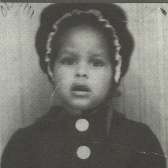When I was around eight years old, I was severely anemic and ended up in the hospital for a blood transfusion. Spending time on the charity ward at the height of racial segregation in the US south of the 1950s probably explains a lot about my subsequent development. Two memories stand out.
Every night when visiting hours ended and my mother disappeared, I worried that she was never coming back. We were poor. I was sickly. Who needed the extra burden?
Yet, miraculously, each night she returned, beautiful and faintly scented by Avon’s “To a Wild Rose.” Often she was accompanied by our minister, a deacon and his wife, and a pint of strawberry or butter pecan ice cream. After they left, I would roll over to face the wall, worry drawing me up like a fried pork rind.
One afternoon the orderlies wheeled in a bed and placed it next to mine. They said the occupant was a boy my age. I couldn’t judge for myself because, like a mummy, every inch of him was wrapped in gauze. They strung him up on wires hooked to the ceiling and left. By the time mama arrived that night, I was upset.
“He stinks,” I whined. “You hush,” she hissed. “Be ashamed of yourself. He's practically burnt to a crisp.”
The next morning, He was dead. I wondered what might be in store for me.
From then on, I took a dim view of things and bent myself towards self-sufficiency. An old neighbor lady, however, saw things differently.
“You so stubborn because they messed up and gave you goat’s blood when you got that transfusion," she explained. "Plus, you ask too many questions.”
My mother encouraged those questions and helped guide me to the answers. Along the way, she continuously pressed me to think for myself, behavior she called "standing on your own two feet."
Most of the other Black adults who had a hand in shaping me, especially my English teachers and my high school guidance counselor, reinforced my home training. Their message was clear: “You are smart, tough, and destined to help change the world.”
I believed all of them even though when they were brain-scrubbing me, I was Negro, female, growing up in an increasingly run-down public housing project, and attending segregated public schools in Charlotte, NC.
Then, at 18, I went away to college in Wisconsin. There I began a life surrounded by white folks who had never seen black folks in person. I am still recovering.
Skeptical optimism and being unafraid of confrontation have fueled my successes as a lawyer, manager, business owner, community activist, and advocate.
I have integrated—by race, gender, class, and attitude—one college, three law schools, several towns, and a host of other public and private institutions, workplaces, and neighborhoods. I drive a stick shift and once upon a time played first chair violin.
Decades after I first put pencil to paper, I spent a month in residence at The MacDowell Colony where I was named the DeWitt Wallace/Readers Digest Fellow for 1997-98.
I have been a writer all my life. Now I just get to do it full-time.
WHEN RACE BECOMES REAL: Black and White Writers Confront Their Personal Histories (Chicago Review Press/Lawrence Hill Books 2002) is my first book.

